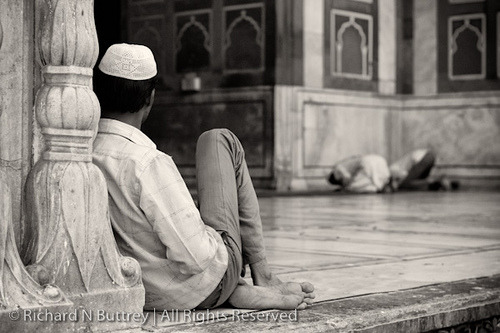Can Good Deeds Be Sabotaged?
Imam al-Ghazali discusses the relationship between acts of outward worship and the heart.
Thus pride will leave your mind only when you know with certainty that the great man is he who is great in the estimation of God; this (i.e. to be great in God’s estimation) is dependent upon one’s good state of mind at the end to one’s life concerning which there is doubt. Then the fear of the end will keep you from being proud at the expense of servants of God, despite the existence of doubt concerning your fate. Your certain belief, your firm faith in God, at present does not exclude the possibility of change in the future, for God is the disposer of minds –He guides him whom He pleases and leads astray whom He pleases.
Prophetic traditions on envy, pride, ostentation, and conceit are numerous. The following single comprehensive Tradition will be sufficient for you concerning these evil qualities of mind.
Ibn al-Mubarak related, with a chain of narrators going back to a certain man, that his man asked Mu’adh: O Mu’adh, tell me a Tradition you heard from God’s Messenger (may God bless him and greet him!). The man continued: Mu’adh wept (at this question of mine) until I thought he would not cease, but at length he ceased to weep; then he said: I heard God’s Messenger (may God bless him and greet him!) saying to me,
“I am going to tell you a Tradition which is such that if you remember it, it will benefit you before God, but if you lose it and do not remember it, your plea of defense before God on the Day of Resurrection will be removed. O Mu’adh, that Tradition is:
Verily God (blessed and exalted is He!), before creating the heavens and the earth, created seven angels, and appointed one of these seven angels as keeper of each of the seven heavens. Now the system is such hat the guardian angels (Qu’ran, 6:61) ascend with man’s deeds performed from morning to evening; each deed has a light like the light of the sun. After bringing it up to the lowest heaven they increase it and multiply it, and the keeper angel entrusted with this heaven says to the guardian angels, ‘With this deed strike the face of its doer; I am in charge of backbiting; my Lord has commanded me not to allow a backbiter’s deed to pass beyond me.’
Then the guardian angels bring one of man’s good deeds and increase it and multiply it until they reach the second heaven with it. Then the keeper angel entrusted there says, ‘Stop and with this deed strike the face of its doer, for through this deed he sought worldly honour; my Lord has commanded me not to allow this deed to pass beyond me, for he used to boast of his deed among his associates; I am the angel in charge of boasting.’
The guardian angels ascend with a man’s deed– such as charity, ritual prayer, and fasting– which is so bright that it astonishes the guardians. They pass with it to the third heaven, and the angel responsible there says, ‘Stop and with this deed strike the face of its doer; I am the angel in charge of pride; my Lord has commanded me not to allow his deed to pass beyond me, for he took pride at the expense of his associates.’
The guardian angels ascend with a man’s deed– such as glorification of God, ritual prayer, fasting, the greater pilgrimage to Mecca (hajj), and the lesser pilgrimage to Mecca (‘umra) — which is shining brightly like a star and resounding. When they pass with it to the fourth heaven, the angel in charge says, ‘Stop and with this deed strike the face of its doer, his back and his abdomen; I am in charge of conceit; my Lord has commanded me not to allow his deed to pass beyond me, for whenever he did a deed he allowed conceit to enter into it.’
The guardian angels ascend with a man’s deed until they pass with it to the fifth heaven. The deed is so embellished that it is like a bridge being conducted to her husband. The angel entrusted with that heaven says, ‘Stop and with this deed strike the face of its doer, carry it to him and place it on his shoulder; I am the angel in charge of envy; he used to envy whoever sought to acquire knowledge and performed a deed like his and all who were superior to men in some way; he used to envy them and slander them; my Lord has commanded me not to allow his deed to pass beyond me.’
The guardian angels ascend with a man’s deed– such as ritual prayer, divine tax, the greater pilgrimage to Mecca, the lesser pilgrimage to Mecca, holy war, and fasting– which is as radiant as the moon. The angels pass with it to the sixth heaven. The angel in charge there says to them, ‘Stop and with this deed strike the face face of its doer, for he never showed mercy to anyone of God’s servants who met with misfortune or disease, but felt pleasure in it; my Lord has commanded me not to allow his deed to pass beyond me.’
The guardian angels ascend with a man’s deed– such as ritual prayer, fasting, spending of wealth in charity and in good causes, holy war, and piety — which has a sound like that of bees and a radiance like that of the sun and which was accompanied by three thousand angels. They pass with it to the seventh heaven. The angel entrusted with this heaven says to them, ‘Stop and with this deed strike the face of its doer as well as his limbs, and lock up his mind; I veil from the Lord every action which is not intended for my Lord; by this deed he only sought something other than God (exalted is He!) — by it he certainly sought high rank among the learned men, mention among religious scholars, and reputation throughout the cities. My Lord has commanded me not to allow his deed to pass beyond me, for any action not performed purely for God is ostentation, and God does not accept the deeds of an ostentatious man.’
The guardian angels ascend with a man’s deed– such as ritual prayer, divine tax, the greater pilgrimage to Mecca, the lesser pilgrimage to Mecca, good character, observance of silence, and remembrance of God (exalted is He!). Each deed is accompanied by the angels of the seven heavens until they have passed through all the veils to the presence of God (exalted is He!) They stand before Him, bearing witness to Him of the good deed done purely for God (exalted is He!). God (exalted is He!) says, ‘You are guardians over the deeds of My servant, but I am the watcher over his mind; he did not seek Me by this deed; he sought something other than Me; so on him is My curse: Then all the angels present says, ‘Your curse and our curse be upon him!’ The seven heavens and those who are there also curse him.”
Having heard this Mu’adh wept. He said: I asked, ‘O Messenger of God, you are God’s Messenger and I am Mu’adh; how shall I have deliverance and salvation?’ The Messenger of God retorted,
“Follow me even if there be some imperfection in your action. O Mu’adh, guard your tongue against slandering your brothers, i.e. those who believe in the Qur’an; ascribe your sins to yourself and not to them; do not ascribe purity to yourself and blame them; do not exalt yourself above them; do not mingle this-worldly activity with the activity of the Hereafter; do not be proud in your society so that men avoid you for your evil character; do not whisper to one man while another man is present; do not magnify your importance over others so that the good things of this world and the Hereafter will depart from you; do not tear to pieces (the character of) people with the result that on the Day of Resurrection the dogs of Hell will tear you to pieces in Hell. God (exalted is He!) said, ‘By those who draw out violently…’ [Quran, 79:1-2]
Do you know what these are, O Mu’adh?’ I asked: What are they, O God’s Messenger (may you be ransomed by my father and mother)? He replied, ‘They are the dogs of Hell drawing the flesh of its dwellers from its bones.’ I asked: O God’s Messenger (may you be ransomed by my father and mother), who is able to get rid of these evil qualities and who will escape from them? He replied, ‘Mu’adh, it is indeed easy for him for whom God makes it easy.’
Khalid ibn Mi’dan said: I have not seen anyone more assiduous in reciting the great Quran than Mu’adh on account of this great Tradition.
—
Quoted from (Bidaya al-Hidaya) Al-Ghazali on Islamic Guidance, trans. by Muhammad Abul Quasem. 1979. p. 90-95

